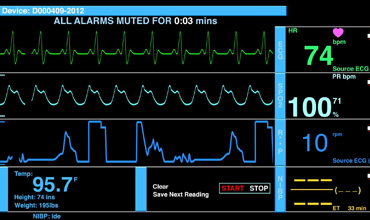Cardiac Monitoring in Her-2 Positive Elderly Patients Treated with Transtuzumab

Abstract:
Human
epidermal growth factor receptor -2 (HER-2) is a member of EGFR (epidermal
growth factor receptor) family, plays a very significant role in cell growth
and proliferation [1] HER – 2 protein is over expressed in 20% of breast cancer
and is associated within aggressive course , poor prognosis and response to
treatment [2-3]. The introduction of transtuzumab, a monoclonal antibody
directed against, the extra cellular domain of HER -2 receptor, has
revolutionized the treatment of HER – 2 positive early breast cancer and has
led to significant improvement in disease free survival and overall survival
over chemotherapy alone.
In randomized multicenter
trials with HER – 2 over expressing metastatic breast cancer patients, addition
of transtuzumab to first line chemotherapy has improved objective response
rate, the time to disease progression and overall survival over chemotherapy alone
[4,5]. Hence transtummab is now considered as the standard of care for all
patients who over amplify HER – 2 neu receptors.
These benefits have come
with the cost of increased risk of cardiotoxicity. Transtuzumab related
cardiotoxicity is mediated by interruption of normal HER – 2 signaling pathway
in the heart, which is responsible for maintenance of normal growth, repair and
survival of cardiomyocytes. Cardiotoxicity related to transtuzumab is different
from that of anthracyclins as it is not dose related and appears to be largely
reversible on discontinuation of therapy. There is no alteration is ultra
structural abnormalities where as that due to anthracyclins are caused by free radical
induced oxidative stress to cardiac muscles cells [12].
References:
[1.] Balducci L, Exlermann M. Cancer and aging.
An evolving Panorama. Hematol Oncol Clin North Am 2000; 14: 1 – 16.
[2.] Cardinale D, Colombo A, Torrisi R et al.
Transtuzumab induced cardiotoxicity: Clinical and Prognostic implications of
troponin I evaluation J Clin Oncol 2010; 28: 3910-3916.
[3.] Cardinale D, Sandri MT. Role of Biomarkers
in Chemotherapy induced cardio toxicity Prog Cardiovasc. Dis 2010; 53: 121 –
129.
[4.] Carlson RW, Allred DC, Anderson BO et al.
Breast Cancer Clinical practice guidelines in oncology J Natt Compr Cane Netw
2009; 7: 122-192.
[5.] Ewer MS,Vooletich MT,Durand JB et al.
Reversibility of Transtuzumab – Related Cardiotoxicity: New Insights Based on
Clinical Course and Response to Medical Treatment .J Clinoncol
2005;23:7820-7826.
[6.] Force T.Krause DS, Van Etten A. Molecular
mechanisms of cardio toxicity of tyrosine kinase inhibition. Nat Rev Cancer
2007; 7; 332-344.
[7.]
Fried G, Regev T
,Moskovitz M.. Transtuzumab related cardiac events in the treatment of Early
breast cancer.
[8.]
Goldhrisch A,
Ingle JN, Gelber RD et al. Thresholds for therapies: highlights of St Gallen
International Expert consensus on primary therapy of early breast cancer 2009.
Ann Oncol 2009, 20: 1319-1329.
[9.] Guarneri V, Lenihan DJ, Valero V et al,
Long term cardiac tolerability of transtummab in meastatic breast cancer. The
M.D. Anderson Cameer Center Experience J Clin Oncol 2006; 24: 4107 – 4115
[10.]
Halyard
MY, Pisanoky TM, Ducck AC et al. Radiotherapy and adjuvant transtuzumab in
operable breast cancer, tolerability and adverse event data from the NCCTG
phase III trail N 9831. J Clin Oncol 2009; 27: 2638 – 2644.
[11.]
Hunt
SA. Acc/AHA 2005 guideline update for the diagnosis and management of chronic
heart failure in the adult: a report of American College of Cardiology/American
Heart Association Task Force on Practice Guidelines (writing committee to
update the 2001 Guidelines for the Evaluation and Management of Heart Failure)
J. Am Coll Cardiol 2005; 4b: el – e 82.
[12.]
Hutchins
LF, Unger JM, Crowley J J et al. Underreparesentation of patients 65 years of
age or older in cancer-treatment trials. N Engl J Med 1999; 341: 2061-2067
[13.]
Ky B,
Putt M, SawayaH, French B, Januzzi JL, Sebag IA, Plana JC, Cohen V ,Banchs J, Carver
JR, Wiegers SE ,Martin RP, Picard MH, Gerszten RE, Halpern EF ,Passeri J, Kuter
I, Scherrer-Crosbie M.. Early increases in multiple Biomarkers Predict
Subsequent cardiotoxicity in Breast Cancer patients treated with Doxorubicin,
Taxanes and transtuzumab
[14.]
L.Tarantini,S.Gori,P.Faggiano
et al.Adjuvant transtuzumab cardiotoxicity in patients over 60 yrs of age with
early breast cancer:a multicentric cohort study.Annals of oncology Vol 23 no 12
Dec. 2012
[15.]
Levy
D, Kenchaiah S, Larson MG et al. Longterm trends in the incidence of and
survival with heart failure. N Eng J med 2002; 347: 1397 – 1402.
[16.]
Marty
M,Cognetti F,Maraninchi D et al.Randomised phase IItrial of efficacy and safety
of transtuzumab combined with docetaxel in patients with her-2 positive
metastatic breast cancer administered as first line treatment:the M77001study
group.JCO 2005.
[17.]
Naumann
D,Rusius V,Margiotta C,Nevill A,Carmichael A,Rea D,Sintler M. Factors predicting
transtuzumab – related cardiotoxicity in a real world population of women with
HER 2 + breast cancer .
[18.]
New
York Heart Association Nomenclature and Criteria for Diagnosis of Disease of
Heart and Great Vessels. 7.th edition Bosion, MA: Little Brown 1973.
[19.]
Palk
S,Hazan R,Fisher ERet al.Pathologic findings from NSABP JCO 1990.
[20.]
Perez
EA, Rodoheffer R. Clinical Cardiac tolerability of transtuzumab J clin Oncol
2004; 22; 322 – 329.
[21.]
Piotrowski
G,Gawor R,Bourge RC,Stasiak A,Potemski P,Gawor Z,Nanda NC,Banach M. Heart
Remodeling induced by adjuvant transtuzumab – Containing chemotherapy for
breast cancer overexpressing human epidermal growth factor receptor type – 2.
[22.]
Salmon
DJ, Clark GM, Wong SG et al. Human breast cancer correlation of relapse and
survival with amplification of HER – 2/nen oncogene. Science 1987;235:177-182.
[23.]
Salmon
DJ, Leyland-Jones B , Shak S et al .Use of chemotherapy plus a monoclonal
antibody against HER-2 for metastatic breast cancer that overexpress HER-2.N Engl
J med 2001;344:783-792.
[24.]
Slamon
D.J, Godolphin W, Jones LA et al studies of HER – 2/men proto oncogene in human
breast and ovarian cancer Science 1989.;244:707-712
[25.]
Yancik
R, Wesley MN, Ries et al. Effect of age and comorbidity in post menopausal
breast cancer patients aged 55 years and older JAMA 2001; 285: 885-892.

